In this issue, we’re breaking a tradition. Typically, this column focuses on knives or pocket tools that are carried in the pocket and are photographed at a 1:1 ratio so they appear life-sized. While that’s great for most typical EDC gear, it shortchanges the reader on some knives or tools that are larger than the height of the magazine. So be forewarned, the camp and field knives seen here are larger in reality than they appear on this page.
While knife steels and knife designs have improved by leaps and bounds over the past 50 years, so much that a typical pocketknife can perform most daily tasks, there are times when you really need a bigger blade. These are the knives we want to reach for when we’re truly off the grid.
Your typical EDC knife from CRKT, Spyderco, or WE Knife might be wonderful for cutting paracord, slicing open delivery boxes, or pinch-hitting for a steak knife. However, if you need to baton wood, make fire, butcher game, or perform real survival chores, you’ll most likely need a bigger blade.
True survival knives kind of caught a bad rap back in the ’80s and ’90s. The theme was “bigger is better,” and we saw designs with 14-inch blades, hollow handles to hold mostly useless survival kits, and gaudy serrations. As a Marine Infantryman and knife-aholic, I quickly learned that many of these knives were simply too heavy, and a canteen of water or extra magazines would be more useful.
The problem was worsened by cheap knock-offs that’d fail when put to real-world use. Yet, as knives have improved in the years since, there are many designs that have absolute real-world potential. They might not fit in your pocket, but you’ll certainly want one on your belt when you’re out in the wilderness.
CRKT
Clever Girl Kukri
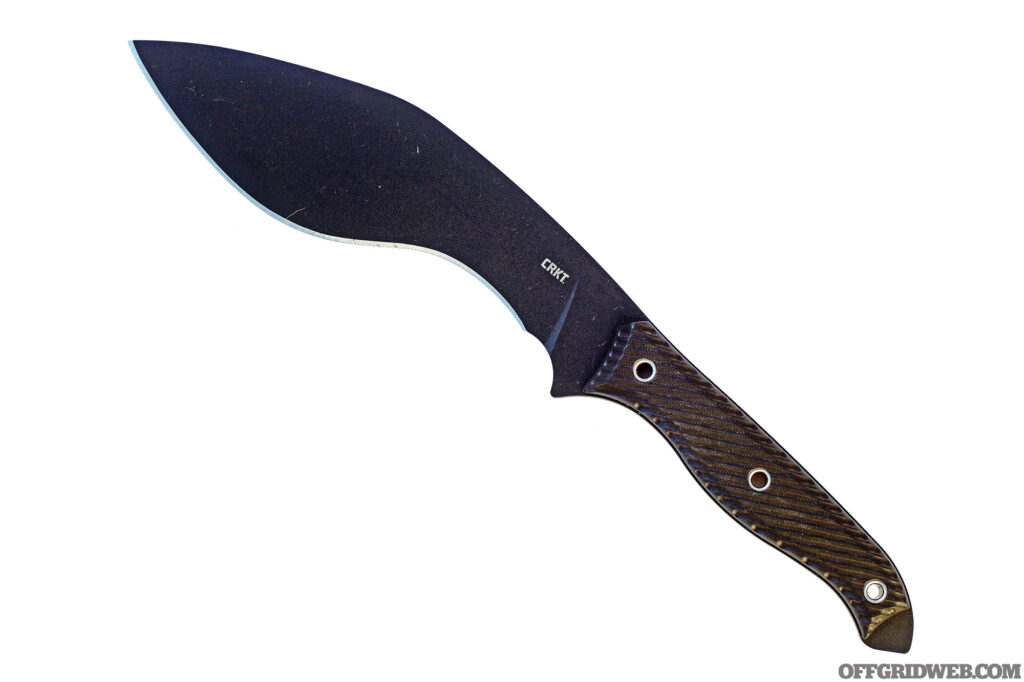
The Clever Girl Kukri is Austin McGlaun’s take on the classic Kukri-style blade made famous by the Gurkha troops of Nepal. While a bit scaled down from the size of a traditional Kukri, it’s still big enough to prevent a true-to-size photograph for our usual columns, or else we would’ve featured it long ago. The good news is that it has allowed us to get a lot more use out of this knife than we normally would have under a tight deadline. McGlaun designed this one for CRKT as part of the company’s Forged by War program. This program allows veterans to design knives and tools for CRKT and direct a portion of the proceeds toward a charity of the maker’s choice. McGlaun’s choice is the Green Beret Foundation.
Overall length: 13.3 inches
Blade Length: 7.8 inches
Weight: 14.2 ounces
Blade Steel: SK-5
Price: $88
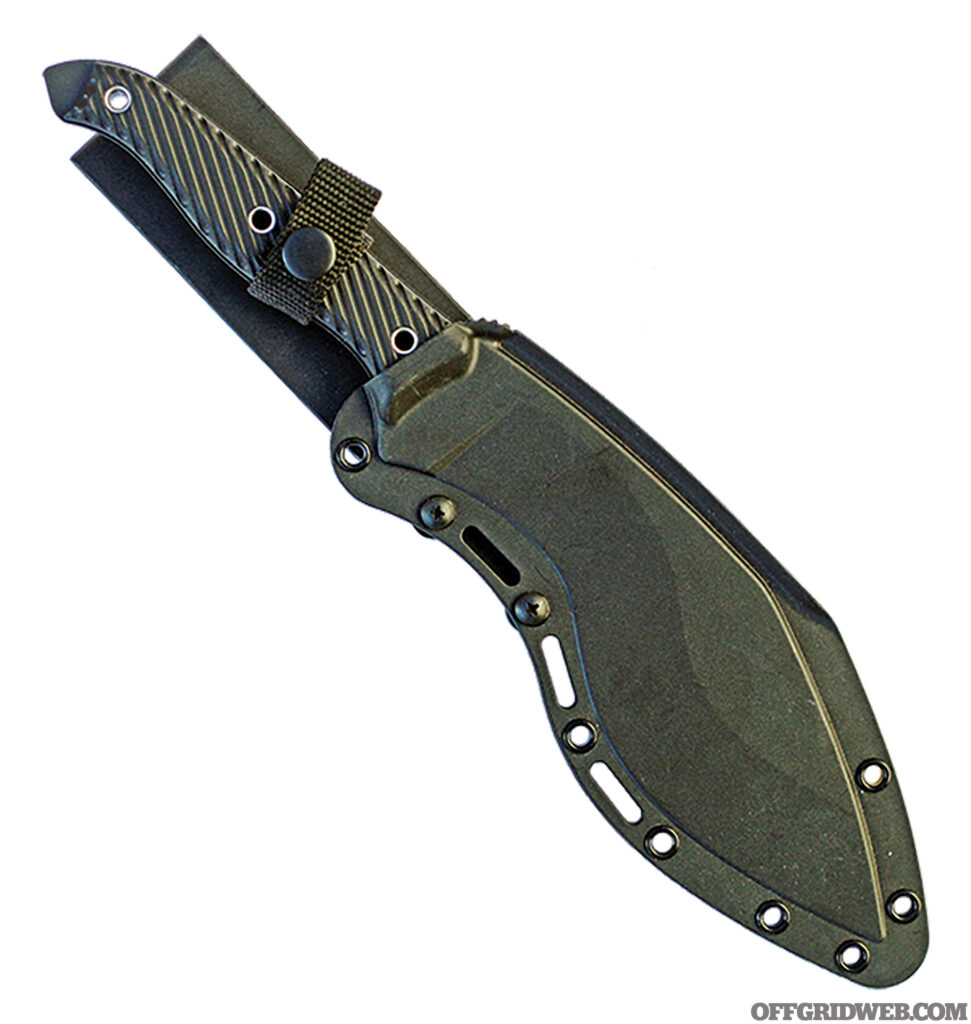
Pros:
- Very sharp out of the box with a nice thin edge for slicing.
- SK-5 is an excellent knife steel with superb edge retention and a reputation for toughness.
- The handle has a very positive feel to it with no hot spots.
Cons:
- As good a steel as SK-5 is, it can be difficult to sharpen due to its toughness.
- Sheath could be more robust.
URL: crkt.com
Cold Steel
Bushman
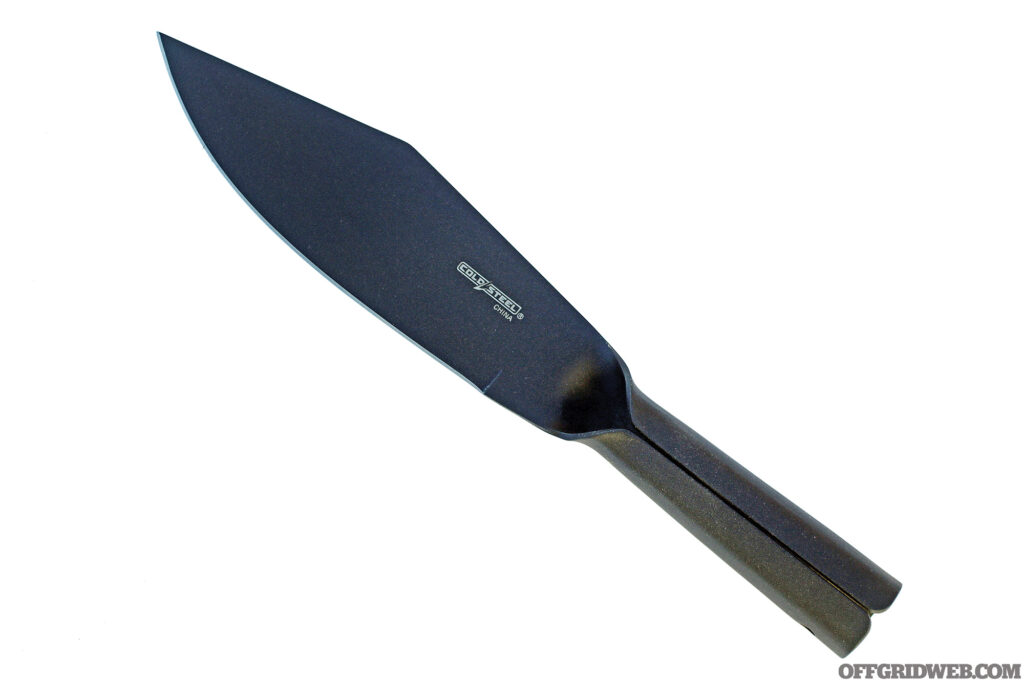
Cold Steel has been producing this design for at least 30 years, and it still holds up today. This is a very minimalist survival type knife that’s at home in the woods, the desert, or the jungle for a wide variety of tasks. It has a hollow handle that allows the knife to be affixed to a shaft for use as a spear or harpoon. A honing steel is included in the sheath so you can touch up the blade if necessary. It may not give you a shaving sharp edge, but you can fix any nicks without having to regrind it. The Bushman has an almost cultlike following among its users, and some of the mods they make to this knife make it a real standout. Whether it’s a regrind or special handle treatment, you can really make this your own.
Overall length: 12.23 inches
Blade Length: 7 inches
Weight: 9.8 ounces
Blade Steel: SK-5
Price: $25
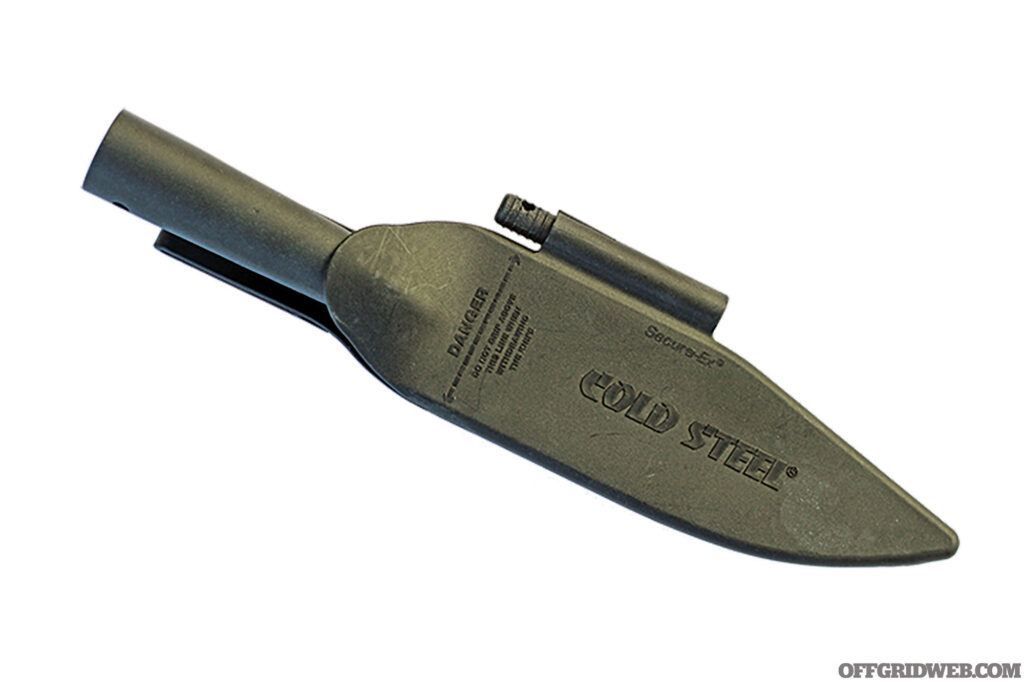
Pros:
- A lot of usable blade for your money
- You can easily affix it to a handle to fashion a spear for hunting or fishing.
- The included honing steel can be used to straighten out any burrs or nicks.
Cons:
- While it’s a bare-bones blade, you might want to wrap the handle in paracord or rubber for better grip.
- The sheath is lacking in many respects.
URL: coldsteel.com
Glock
Model 81 Survival Knife
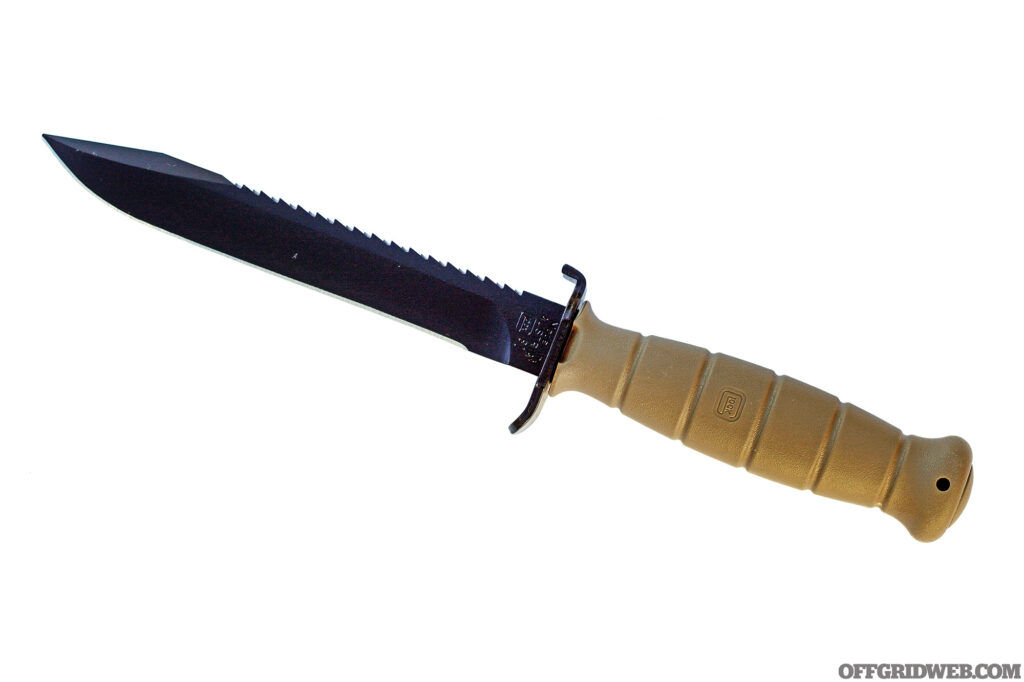
When most of us hear, “Glock,” we think of the polymer-framed, striker-fired pistol. Yet, before they made their world-famous pistols, Glock produced knives, bayonets, and entrenching tools for the Austrian army. Glock still produces these knives, and the price doesn’t seem to have changed in the past 25 years or so. The quality is still there, and, in many ways, it represents one of our favorite field knives. The sheath is amazing, the serrations are well thought out, and the guard incorporates a bottle opener, but it’s not shipped incredibly sharp and has a relatively thick edge. Glock doesn’t usually list the M81 on their website, but it’s available through retailers such as Midway USA.
Overall length: 11.4 inches
Blade Length: 6.5 inches
Weight: 7.13 ounces
Blade Steel: 1095
Price: $30
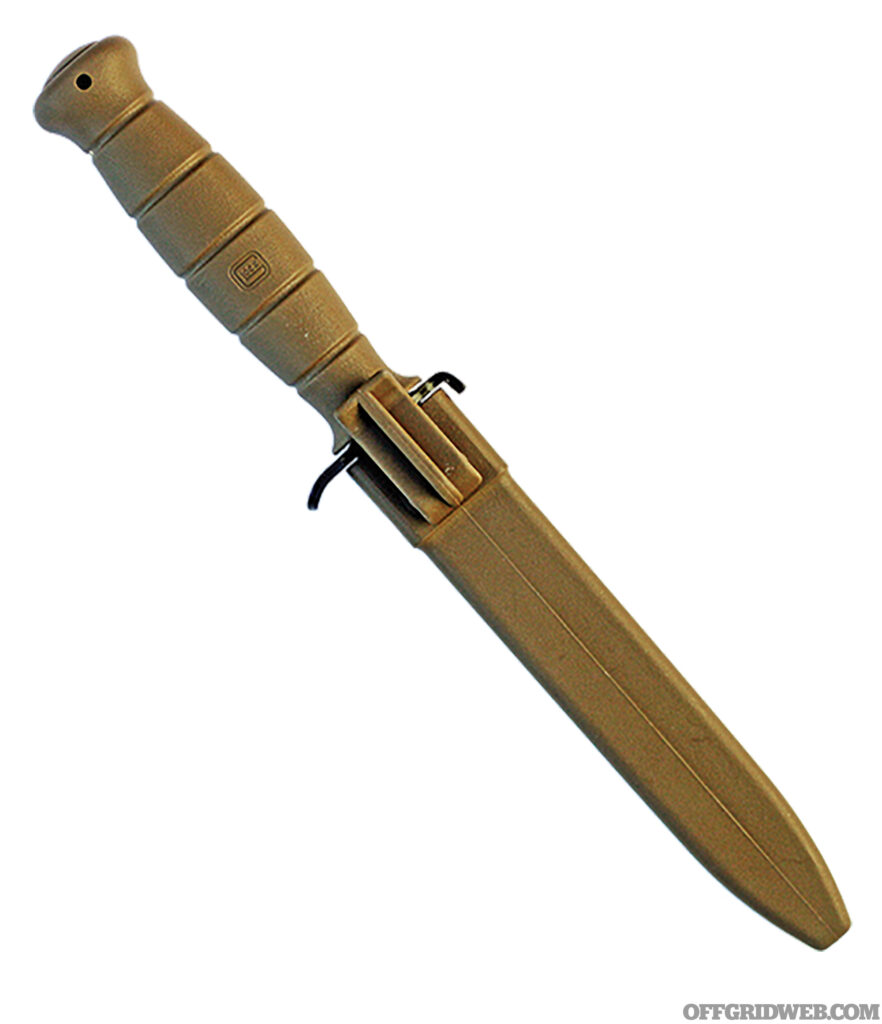
Pros:
- Once the blade has been reprofiled and sharpened, these knives are absolute workhorses.
- Amazing serrations.
- The sheath looks flimsy but is extremely effective.
Cons:
- They ship dull and with a rather thick edge. Being 1095 steel, it takes a while to turn it into a decent working blade.
- Be sure to maintain the blade after a regrind; 1095 is prone to rusting.
URL: eu.glock.com
KaBar
D2 Extreme Straight Edge
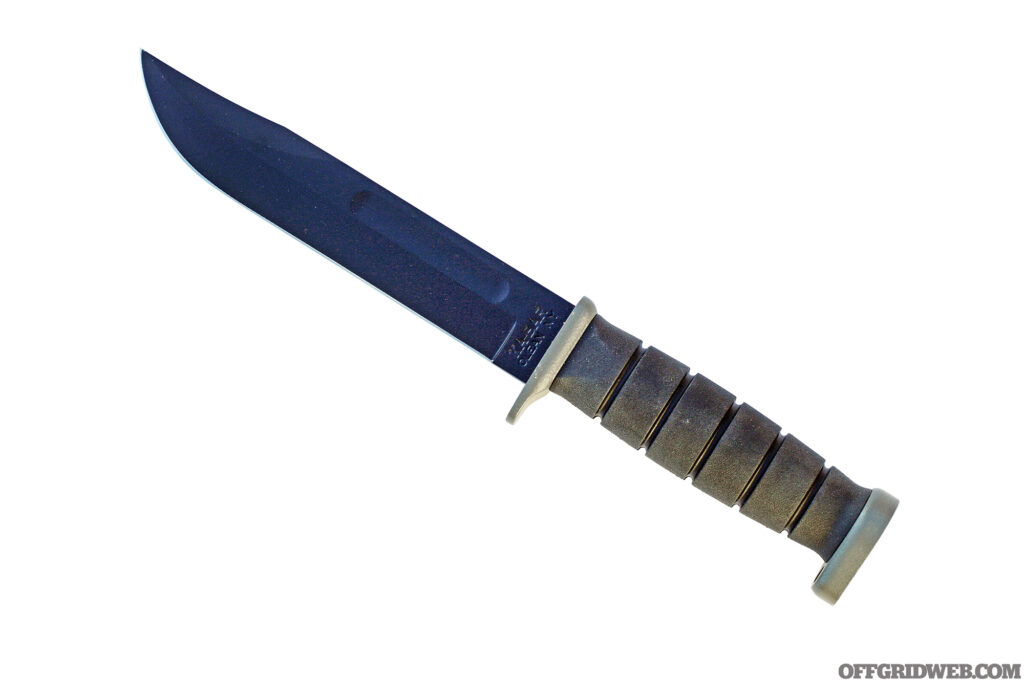
While the traditional KaBar is a favorite and iconic knife, sometimes even a classic can be improved, particularly with regard to blade steel and handle treatment. About 30 years ago, KaBar upgraded their classic military knife into a version using D2 tool steel, and variants were made with serrations. The Extreme Straight Edge model has more of the classic look of the iconic KaBar without these serrations. It comes with a rugged thermoplastic sheath that can be worn on a belt or lashed to a pack or load-bearing equipment. If you love your KaBar but want a more rugged and weather-resistant version, this may be ideal.
Overall length: 12 inches
Blade Length: 7 inches
Weight: 12 ounces
Blade Steel: D2
Price: $206
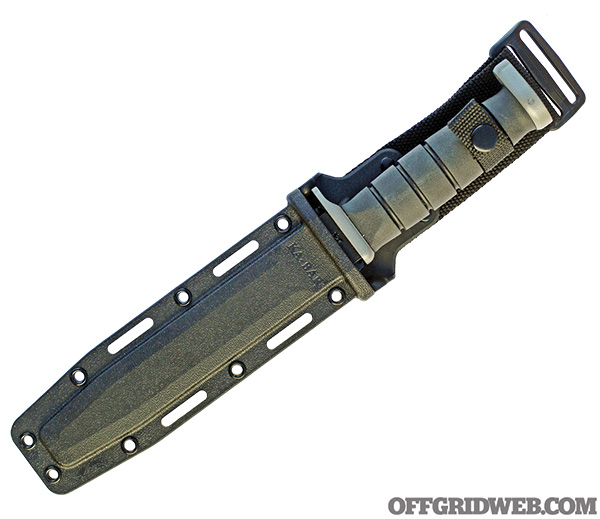
Pros:
- D2 steel is a working-class tool steel that’s unbelievably tough.
- Razor sharp out of the box, the way all knives should ship.
- The handle is comfortable and follows the contour of the traditional leather stacked washer pattern.
Cons:
- D2 steel is great, but the uncoated edge can rust if not maintained. It can also be tough to sharpen.
- Sheath fitment is a bit loose.
URL: kabar.com
Skallywag Tactical
Gunners Mate
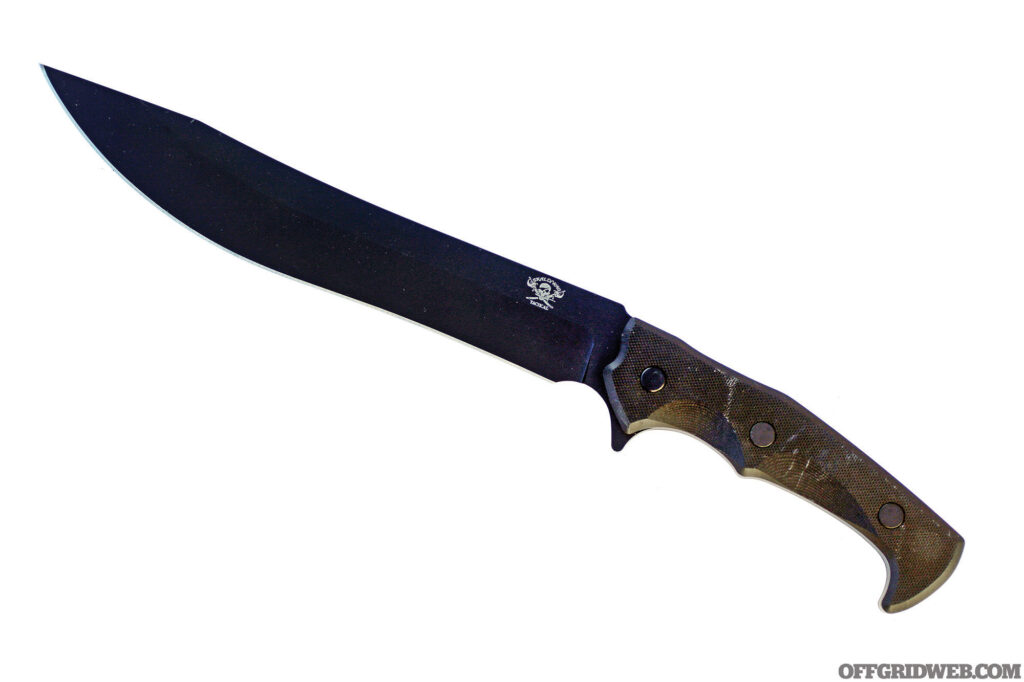
Skallywag Tactical produces great designs, and the Gunners Mate is a bit of a legend in that lineup. It was designed to “remove limbs,” be they trees or other types. There’s a lot to love about an 8.5-inch blade of D2 that’s razor sharp when you take it out of the box. It has more of the heft and feel of a boarding cutlass as opposed to a knife. The blade coating is nicely done, and it really holds up even if you put a lot of use into your knives. It makes for a great camp knife without encroaching into machete territory. It’d make for an impressive fighting blade as well.
Overall length: 14.5 inches
Blade Length: 8.5 inches
Weight: 16 ounces
Blade Steel: D2
Price: $190
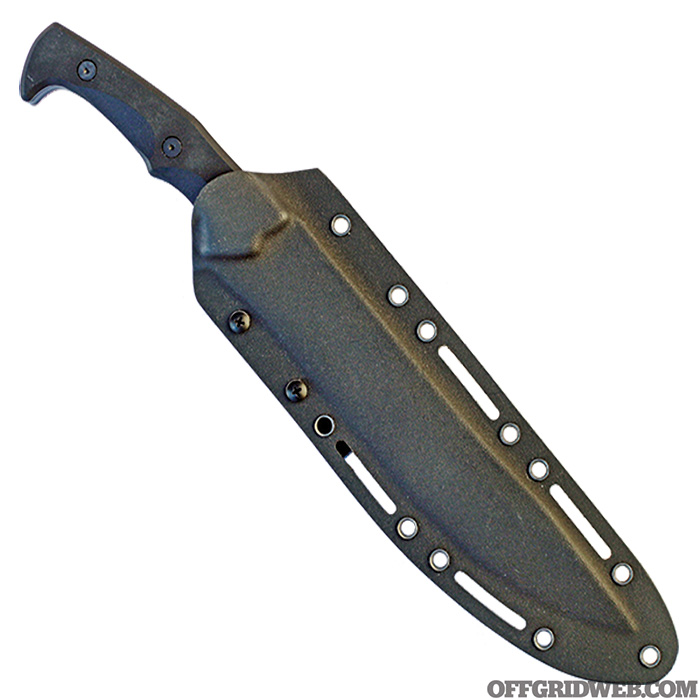
Pros:
- The blade is generously sized and can tackle just about any task you have in store for it.
- Handle is extremely comfortable.
- The D2 steel blade is sharp from the box and incredibly tough.
Cons:
- A bit on the large side as a daily carry blade, but completely at home in the wild.
- Even though the steel is coated, keep the exposed edge well-oiled if you’re in a humid or wet environment.
URL: skallywagtactical.com
Slysteel
Spectre
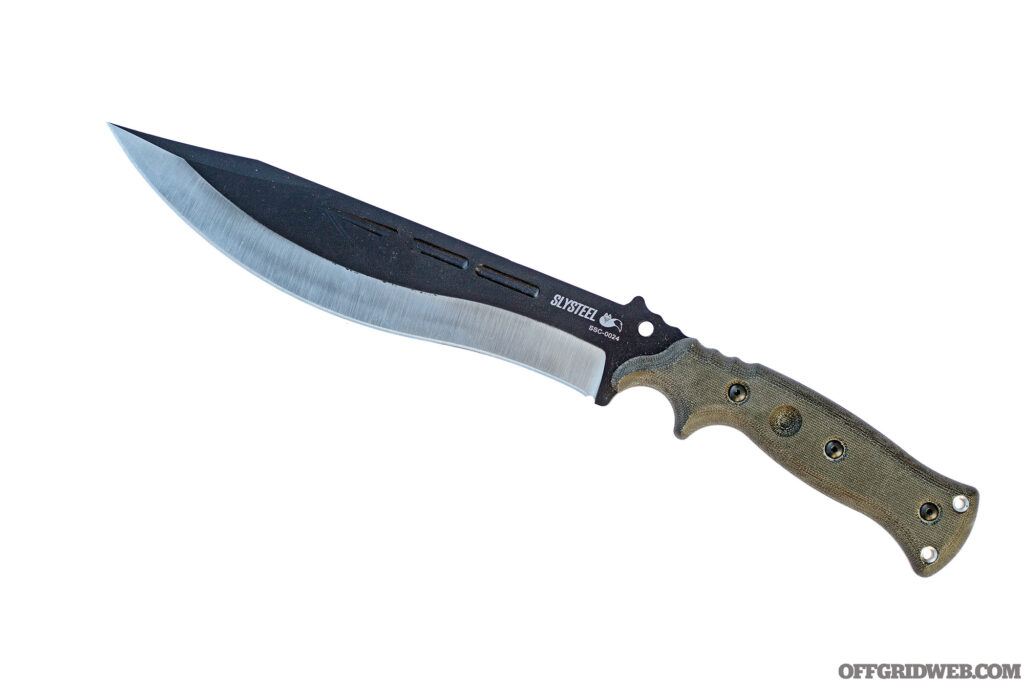
Oliver Hannan of Slysteel designed this model for a CIA operative who wanted a large knife for fieldcraft and self-defense. Hannan’s designs have been featured on several TV shows about wilderness survival and often include design details for tasks beyond cutting. This isn’t just another big chopper; it’s surprisingly light and balanced. The hole in the blade works as a bullet puller so you can use the powder as a fire-starting aid. The spine of the knife can be held comfortably as a draw knife because of the forward tumbled edge. The section of 90-degree spine can be used as a scraper to remove bark from branches or as a ferro rod striker. The more rounded, tumbled edge of the spine prolongs the life of your baton when using it for splitting. The Micarta handle incorporates a spindle divot for fire-starting.
Overall length: 15.5 inches
Blade Length: 9.3 inches
Weight: 23 ounces
Blade Steel: 1095
Price: $370
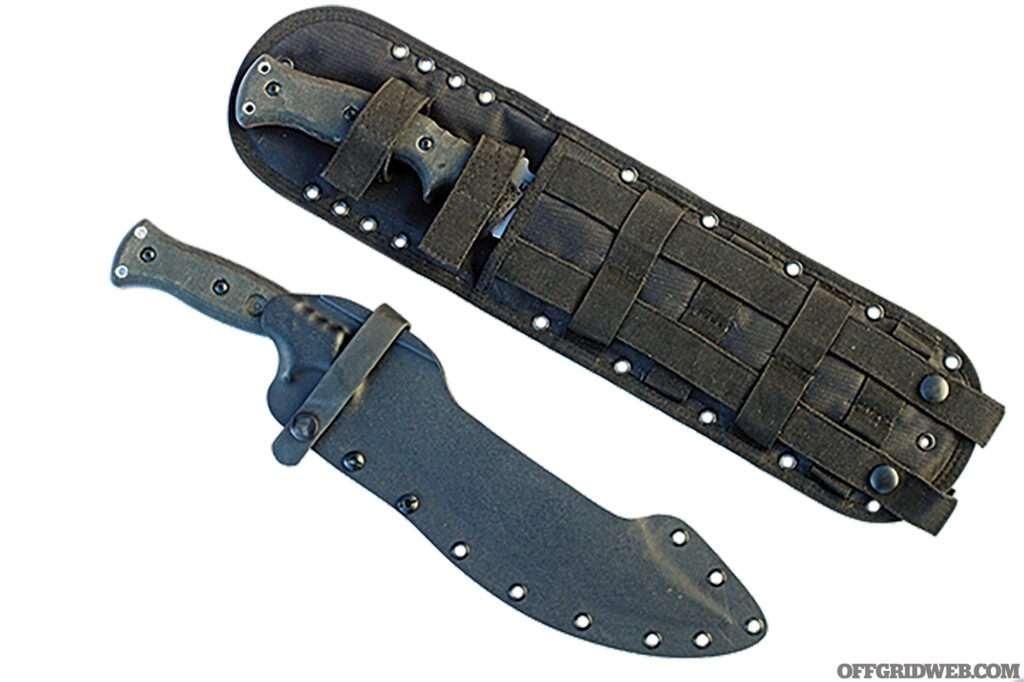
Pros:
- Very handy and light for a large knife.
- Versatile handle.
- Both sheath options are ingenious; the MOLLE sheath is perfect to strap to a pack or belt and can hold extra gear.
Cons:
- Too large for discreet everyday carry.
- Could’ve been sharper out of the box.
URL: slysteel.com
TOPS Knives
Tom Brown Tracker Coyote Tan
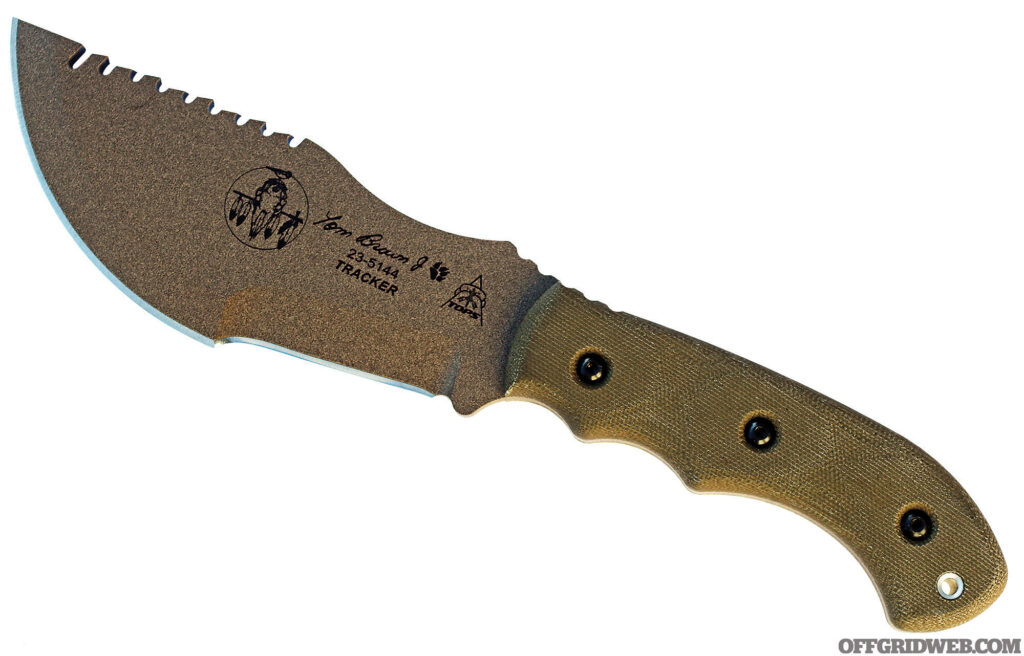
The Tracker was designed by survivalist guru Tom Brown, and it’s one of the most popular and controversial knives made by TOPS. This is a special-purpose survival knife that can help you perform numerous tasks using one tool instead of five different ones. You have a draw blade, a filet-style blade, and a thicker chopping or batoning section, as well as serrations on the spine. The sheath sports two spring clips so it can be secured to the belt, a pack, or even mounted inside the door pocket of a truck. TOPS offers several scaled-down versions of this knife, but this one seems to be the best survival tool of the bunch.
Overall length: 11.9 inches
Blade Length: 6.4 inches
Weight: 21 ounces
Blade Steel: 1095
Price: $320
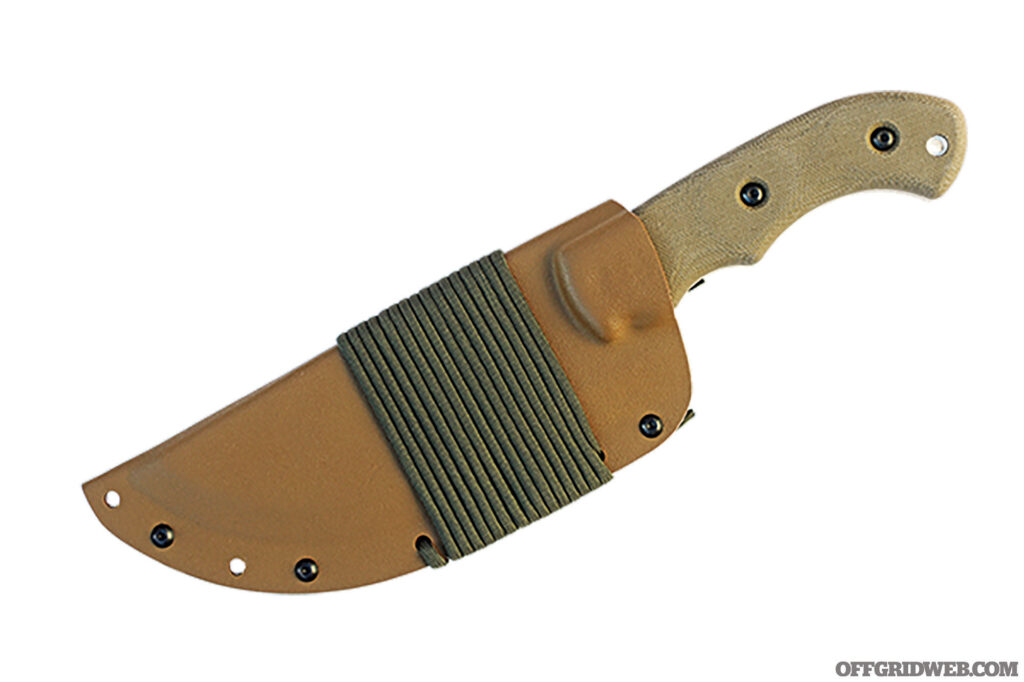
Pros:
- The forward grind is a powerful chopper; the rear grind is angled perfectly for drawing and slicing.
- This gives you a chopper, skinner, baton, filet, and a saw all in one package without hauling an entire toolbox around.
- The Kydex sheath is outstanding.
Cons:
- At 21 ounces, it’s not exactly light.
- It lacks a stabby tip. If you need to dress game, you may need to carry a second knife.
URL: topsknives.com
Read More
Subscribe to Recoil Offgrid's free newsletter for more content like this.
The post Review: Camp and Field Knives appeared first on RECOIL OFFGRID.
By: Patrick Diedrich
Title: Review: Camp and Field Knives
Sourced From: www.offgridweb.com/gear/review-camp-and-field-knives/
Published Date: Sat, 02 Dec 2023 12:00:38 +0000
------------------------
Did you miss our previous article...
https://bushcrafttips.com/bushcraft-news/cybertruck-future-or-failure
 What is BushcraftSurvival SkillsToolsVideosBushcraft CampsBushcraft KitsBushcraft ProjectsPrivacy PolicyTerms And Conditions
What is BushcraftSurvival SkillsToolsVideosBushcraft CampsBushcraft KitsBushcraft ProjectsPrivacy PolicyTerms And Conditions
